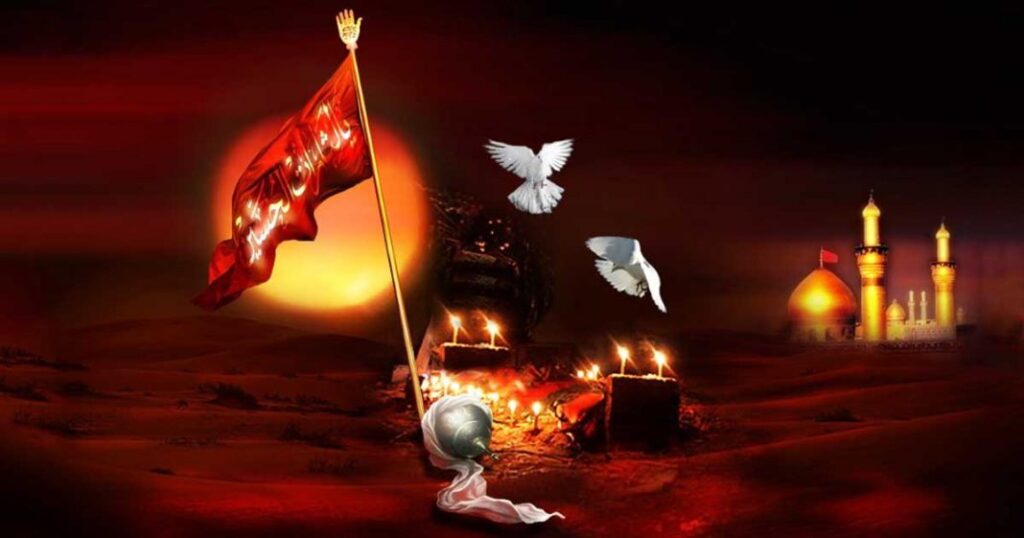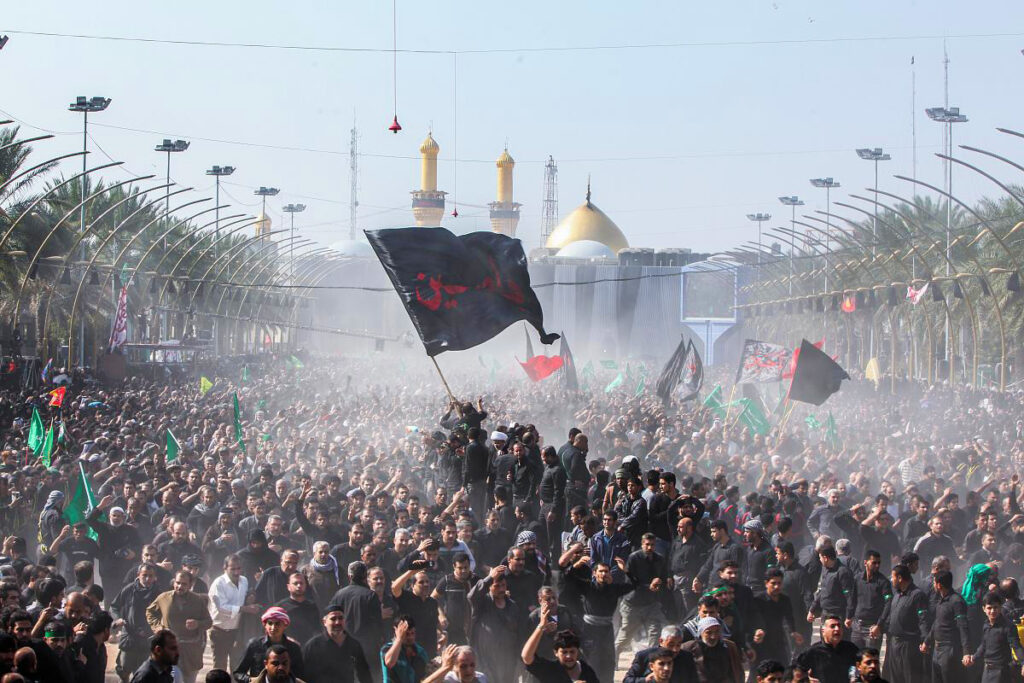Explore the inspiring story of Imam Husain ibn Ali (R.A.), from his blessed birth to his noble martyrdom at Karbala. This step-by-step guide dives deep into his life, values, sacrifices, and the timeless lessons we can learn today. The Story of Imam Husain ibn Ali (R.A.)—From Birth to Martyrdom.
I’ve always been inspired by the life of Imam Husain ibn Ali (R.A.), the beloved grandson of Prophet Muhammad (ﷺ). His journey was filled with faith, courage, and sacrifice. In this guide, I will walk you through his life from his early days in Madinah to the tragic yet honorable events of Karbala. Every chapter of his life holds lessons for us to live with truth and justice.
H1: Birth and Early Life of Imam Husain ibn Ali (R.A.)
Imam Husain (R.A.) was born on the 5th of Sha’ban, 4 AH (626 CE), in Madinah. He was the son of Ali ibn Abi Talib (R.A.) and Fatimah al-Zahra (R.A.), the daughter of Prophet Muhammad (ﷺ). The Prophet cherished him deeply, often embracing him with affection. From his earliest days, Husain grew up in a home blessed with piety, learning firsthand the values of patience, kindness, and steadfastness in faith.

H2: The Love of the Prophet for Imam Husain
The Prophet Muhammad (ﷺ) had immense love for Imam Husain (R.A.) and his brother, Imam Hasan (R.A.). He famously said:
“Husain is from me, and I am from Husain. Allah loves whoever loves Husain.”
These words show the depth of their bond. I often reflect on how special this relationship was, as the Prophet personally nurtured his grandsons, instilling in them the pure teachings of Islam from such a young age.
H2: Education and Upbringing
Growing up, Imam Husain (R.A.) learned directly from the Prophet Muhammad (ﷺ) and later from his father, Ali ibn Abi Talib (R.A.), who was known for his deep knowledge and wisdom. Husain memorized the Qur’an, studied the sayings of the Prophet, and mastered the art of leadership. These early experiences shaped him into a man of principle, someone who could not be swayed by power or fear.
H1: Life After the Prophet’s Passing
After the Prophet (ﷺ) passed away, the Muslim Ummah saw many changes in leadership. Imam Husain (R.A.) lived through the caliphates of Abu Bakr (R.A.), Umar ibn al-Khattab (R.A.), and Uthman ibn Affan (R.A.). During these times, he supported unity and avoided unnecessary conflict. I admire how he always chose peace when possible but never compromised when it came to protecting the principles of Islam.
H2: Role During Imam Ali’s Caliphate
When his father, Ali ibn Abi Talib (R.A.), became the fourth Caliph, Imam Husain (R.A.) stood by him through political challenges and civil wars. His loyalty to his father was unshakable, and he learned firsthand about the difficulties of leading a diverse Muslim community. This period deepened his understanding of justice and the need for moral leadership, which would guide him in the years ahead.

H1: The Rise of Yazid and the Call for Allegiance
After the death of Muawiyah ibn Abi Sufyan (R.A.), his son Yazid took power in 680 CE. Yazid demanded allegiance from key Muslim figures, including Imam Husain (R.A.). However, Husain knew Yazid’s rule contradicted Islamic values. I truly respect how Husain refused to pledge bay’ah (allegiance) to a leader he saw as unjust, even though this decision meant risking his life and the safety of his family.
H2: Departure from Makkah
Fearing bloodshed in Makkah during the sacred months, Imam Husain (R.A.) left for Kufa, responding to letters from its people who promised support. Along the way, I imagine the mixture of hope and caution he must have felt—knowing that betrayal was possible but trusting in Allah’s plan. His journey shows the importance of standing for justice, even when the outcome is uncertain.
H2: Arrival at Karbala
Before reaching Kufa, Husain’s caravan was intercepted by Yazid’s army, led by Umar ibn Sa’d. Forced to camp in Karbala on the 2nd of Muharram, 61 AH, Husain and his small group of about 72 companions faced severe restrictions, including a water blockade. The resilience they showed in those days before the battle is a testament to their unwavering faith and trust in Allah.
H1: The Day of Ashura – The Battle of Karbala
On the 10th of Muharram, known as Ashura, the Battle of Karbala began. Despite being vastly outnumbered, Imam Husain (R.A.) and his companions fought bravely. One by one, his loved ones, including his sons and nephews, were martyred. I can hardly imagine the emotional strength it took to endure such loss while still standing firm. This day became a symbol of sacrifice for the sake of truth.
H2: Martyrdom of Imam Husain (R.A.)
By the afternoon of Ashura, Imam Husain (R.A.) was left alone. Exhausted and wounded, he still fought with dignity until he was martyred. His noble stand ended his life on earth, but his sacrifice became an eternal beacon for justice. His death was not a defeat—it was a moral victory that ensured Islam’s principles remained uncorrupted, even in the face of tyranny.

H1: Aftermath and Captivity of His Family
Following the battle, the surviving women and children, led by Zainab bint Ali (R.A.), were taken as captives to Yazid’s court. Despite their suffering, Zainab’s powerful speeches exposed the injustice of Karbala. The courage she displayed shows that the legacy of Imam Husain (R.A.) continued through those who spoke truth without fear, ensuring that the world would never forget his sacrifice.
H2: Timeless Lessons from His Life
From Imam Husain’s life, I take away these lessons:
- Stand firm against injustice, no matter the odds.
- Value truth over worldly gain.
- Show patience in hardship and faith in Allah.
- Lead with humility and compassion.
These lessons remain relevant today, reminding me that Karbala is not just a historical event—it’s a guide for living with integrity.
Table—Key Events in Imam Husain’s Life
| Year (CE/AH) | Event | Significance |
|---|---|---|
| 626 CE / 4 AH | Birth of Imam Husain | Grandson of the Prophet ﷺ |
| 661 CE / 40 AH | Martyrdom of Ali (R.A.) | Leadership challenge |
| 680 CE / 61 AH | Refusal to pledge allegiance | Stand for justice |
| 680 CE / 61 AH | Battle of Karbala | Sacrifice for Islam |

Quotes About Imam Husain (R.A.)
“Husain is from me, and I am from Husain. Allah loves whoever loves Husain.” – Prophet Muhammad (ﷺ)
“Every day is Ashura, and every land is Karbala.” – Saying to inspire justice everywhere.
Key Takeaways
- Imam Husain ibn Ali (R.A.) lived a life of faith, courage, and sacrifice.
- He refused allegiance to an unjust ruler, protecting Islam’s values.
- The Battle of Karbala was a stand for truth over tyranny.
- His legacy inspires generations to uphold justice, no matter the cost.
Conclusion
The life of Imam Husain ibn Ali (R.A.), from his blessed birth to his noble martyrdom, is a shining example of courage and integrity. His stand at Karbala reminds us that truth and justice are worth any sacrifice. As I reflect on his journey, I feel inspired to uphold the values he lived by—faith, patience, and unwavering commitment to what is right. His story will forever guide those seeking moral strength.


